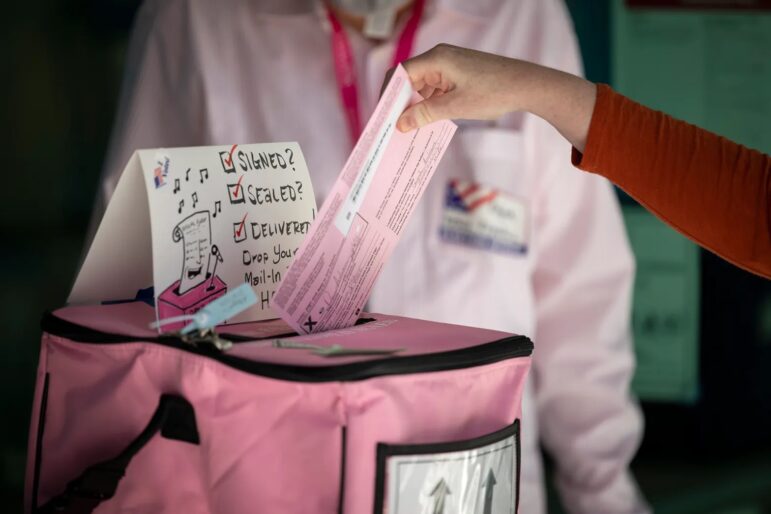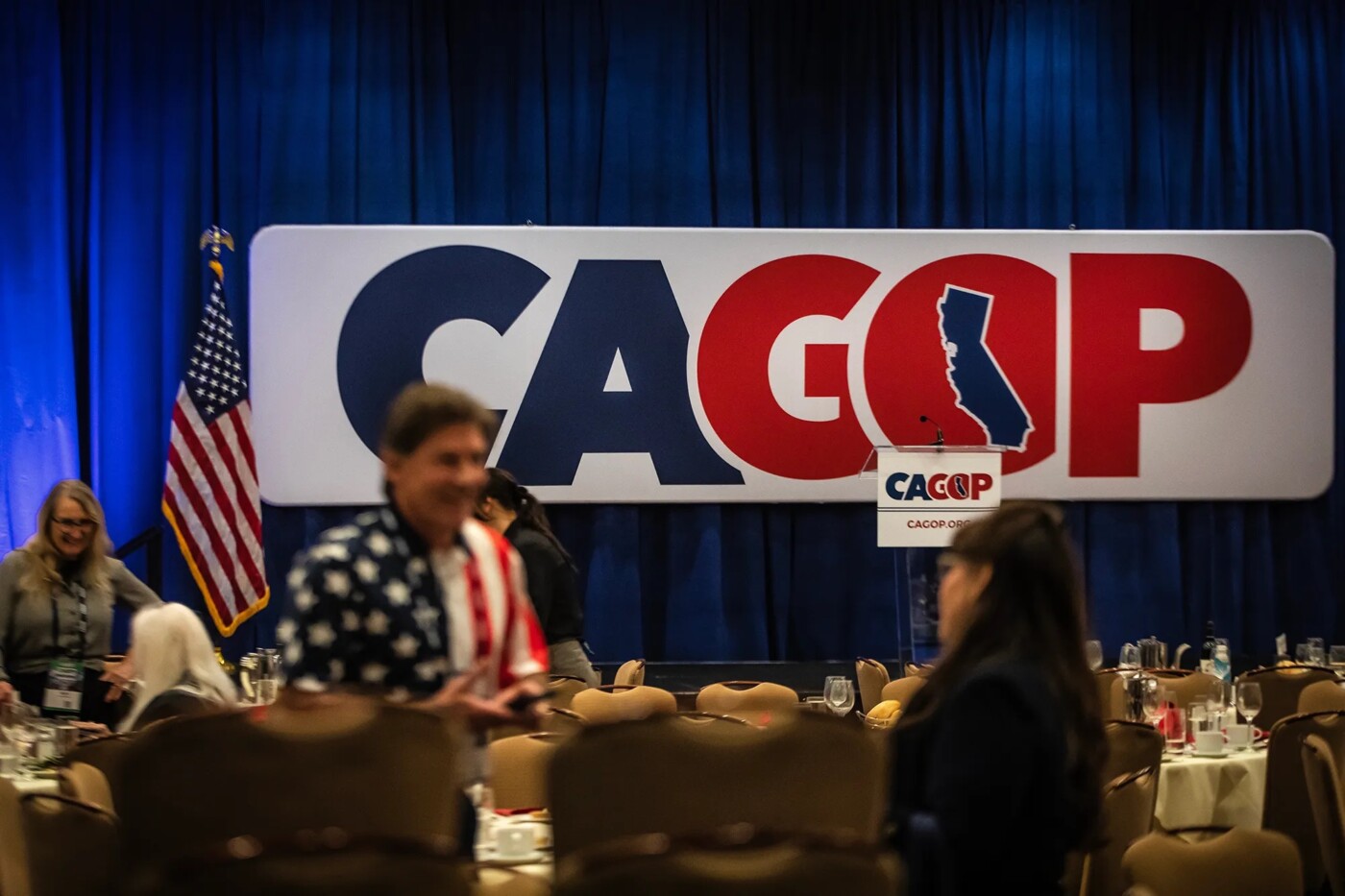For the California Republican Party, the moment could be ripe with opportunity.
Nationally, some reliably Democratic voters are straying, including some Latinos and those who blame Democratic policies for rising crime and inflation. But the state GOP’s focus at its fall convention this weekend is not on finding ways to court those voters.
Instead — and despite a losing streak in statewide races in California that dates to 2006 — the party faithful appears intent on doubling down in its embrace of former President Donald Trump, with a lineup in Anaheim that features Trump as a keynote speaker and with rules for the March primary that make it possible for him to sweep all delegates to the national nominating convention.
So what’s the party’s goal during the convention?
Jessica Millan Patterson, the party’s chairperson, told Fox News that the convention seeks to tap into the state party’s growing influence on national politics, citing the congressional victories in California last year that helped Republicans win control of the U.S. House.
“We will be focused on the work that we have to do in the primary to make sure that we have a voice in saying who our nominee at the top of the ticket will be, but also preparing to not only hold on to our majority but grow the majority in Congress in 2024,” said Patterson, who the party did not make available for an interview.
But not everyone is as optimistic about the party’s prospects.
“The Republican Party is really not trying to be a viable political party anymore in California,” Mike Madrid, former political director for the state party and a longtime political strategist, told Capitol Weekly.
“It’s kind of content being this small, regional marginalized social movement and for the moment that’s what it is, and that’s probably what it’ll be for a very long time.”
Trump plans to attend the convention on Friday after skipping the second Republican presidential primary debate Wednesday night in Simi Valley.
Despite a pile-up of federal and state charges that accuse him of interfering in the 2020 election and mishandling classified documents, the former president is polling far ahead of his competitors for the Republican nomination. In California, according to a new Public Policy Institute of California survey, he’s at 48%, which would fall just short of the 50% plus one he needs to win all 169 delegates in March. DeSantis is the only other candidate in double digits, at 14%.
Cassidy Reller, an assistant professor of politics at the University of Florida who studies political parties, noted that the party’s strategy reflects that most legislative and congressional districts that elect Republicans in California are extremely conservative.
But that puts the party in a tough situation competing statewide. As of February, of 22 million voters in California, only 24% are registered as Republicans, 47% as Democrats and 22% without a party preference.
“I think there are a lot of people who would be willing to vote for a Republican or more moderate candidate who would be pro-choice and pro-LGBTQ rights, but also anti-raising taxes and anti-big government in the state of California,” he said. “I think a lot of Californians are significantly more fiscally conservative than we give them credit for.”
Some in the state Republican Party do want to see it shift some of its stances, in hopes of attracting more voters.
In July, the state GOP’s policy committee recommended updates to its platform — that delegates will vote on this weekend — that would remove specific opposition to same-sex marriage and abortion.
Those changes would be more in line with the views of a majority of likely voters in California, according to the PPIC poll: 70% disapprove of overturning Roe v. Wade, and 60% disapprove of the Supreme Court allowing a website designer to deny services to a same-sex couple.
But Harmeet Dhillon, a former state party vice chairperson and one of three Californians on the Republican National Committee, argues that the platform and what candidates run on are two different things. The party platform’s purpose is to attract its core supporters and volunteers, she said.
Last week, Dhillon and more than 30 local party leaders and state lawmakers urged delegates to readopt the existing platform instead of watering it down.
“Our volunteers and our core supporters in our base are ideologically motivated. They want a party that is different than the other party,” Dhillon told CalMatters. “If our party was simply looking at what wins elections in California and wants to just copy that, then why would people want to spend their nights and weekends working for our party, working to change our country for the better?”
For Dhillon, the proposed platform amendments show the current party leadership’s less-than-transparent approach: “A rigged committee was convened with an outcome that is quite far from what the mainstream core of the party stands for. Maybe those values will change over time. Maybe they won’t, but they’re definitely not going to change through a process like we have.”
Eric Early, who ran unsuccessfully for attorney general for a second time in 2022 and is now a Republican candidate for the U.S. Senate seat being vacated by Democrat Dianne Feinstein, echoed the sentiments about inauthenticity.
“The last thing we should be doing as a state party right now is trying to water down the party platform to try and kowtow, frankly, to certain groups that will never be friendly to Republicans, regardless,” he said.
That approach, however, may not work in the state’s top-two primary system, which was designed to move voters away from electing the most extreme candidate of each party to more moderate candidates.
And Early needs as many different voters as possible if he wants to make the November 2024 general election: He and fellow Republican James Bradley are at 5% each in the new PPIC poll among likely voters, far behind Democratic Reps. Adam Schiff (20%) and Katie Porter (15%).
Reller said the top-two system has largely fallen short of its goal, though he pointed to one example where it worked: U.S. Rep. David Valadao, a Republican from Hanford, narrowly won last November in a district that voted for Joe Biden. Valadao ran a significantly more moderate campaign and even voted in favor of impeaching Trump — and managed to defeat some strong Democratic challengers, Reller said.
“It’s really surprising that other California Republicans haven’t adopted a similar position or strategy,” he said.
The party’s “Parent Revolt” strategy last year (there’s a follow-up session Saturday) did elevate some local school board candidates, but the few wins were in school districts where the parental rights movement was already strong, Madrid said.
According to an analysis by CalMatters last November, of 150 local school board candidates endorsed by either Lance Christensen — the Republican state schools superintendent candidate who failed to defeat Democratic incumbent Tony Thurmond — or the conservative “parents rights” group Moms For Liberty, only a third won in 2022.
There is one departure from Trump orthodoxy the party is willing to make this year — encouraging Republican voters to take advantage of California’s mail balloting system.
That’s a dramatic shift from years of unfounded allegations about widespread vote-by-mail fraud that were amplified by Trump. Democrats, meanwhile, have encouraged expanded voting options, which many generally believe has worked in their favor (Research during the pandemic showed that both parties benefit from voting by mail).
Ahead of next year’s election, the national Republican Party announced a “Bank Your Vote” initiative aimed at “maximizing pre-Election Day voting,” including by targeting young and non-white voters.

And at the state party convention, delegates can attend a session on “ballot harvesting” and another titled “Bank your Vote/Protect your Vote.”
Dhillon said she is encouraging people to vote early — though she still thinks the vote-by-mail system is “a mess.”
“While that’s the system, we’re competing in that system,” she said. “We’re getting our own people out there to collect ballots from voters, and encouraging them, while we try to change the process.”
Early, the Senate candidate, is also encouraging people to vote as early as possible — even if that means voting by mail, which he generally opposes.
“We have to do what the other side has been doing,” he said.
